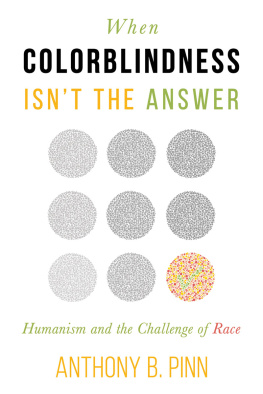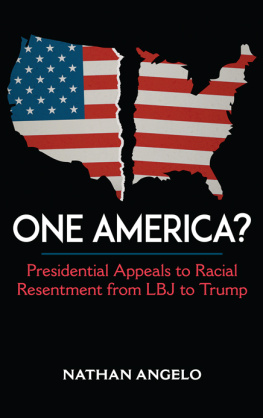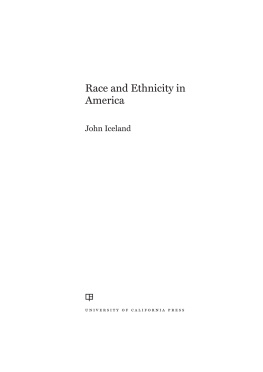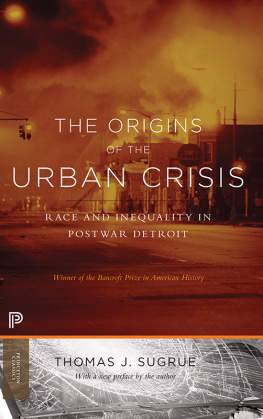

2018 by Center on Race, Inequality, and the Law, New York University School of Law
All rights reserved.
No part of this book may be reproduced, in any form, without written permission from the publisher.
Requests for permission to reproduce selections from this book should be mailed to: Permissions Department, The New Press, 120 Wall Street, 31st floor, New York, NY 10005.
Published in the United States by The New Press, New York, 2018
Distributed by Two Rivers Distribution
ISBN 978-1-62097-396-7 (e-book)
CIP data is available
The New Press publishes books that promote and enrich public discussion and understanding of the issues vital to our democracy and to a more equitable world. These books are made possible by the enthusiasm of our readers; the support of a committed group of donors, large and small; the collaboration of our many partners in the independent media and the not-for-profit sector; booksellers, who often hand-sell New Press books; librarians; and above all by our authors.
www.thenewpress.com
Book design and composition by Bookbright Media
This book was set in Caslon 540 and Oswald
10 9 8 7 6 5 4 3 2 1
Contents
In early 2017, New York University School of Law launched the Center on Race, Inequality, and the Lawa center founded on the idea that lawyers today cannot fully understand the American legal landscape without studying the relationship among race, ethnicity, and economic inequality on one hand, and the successes and failures of legal structures on the other. The center created a formal home for scholars who shed light on the interplay between racial politics and law in the United States, carrying on the tradition of NYUs own Derrick Bell.
To mark the founding of this center, I asked Loretta Lynch, former attorney general of the United States; Sherrilyn Ifill (an alumna of NYU Law), president and director-counsel of the NAACP Legal Defense and Educational Fund; and NYU professor of clinical law and executive director of the Equal Justice Initiative, Bryan Stevenson, to join me for a conversation on February 27, 2017about one month into the presidency of Donald Trump. I felt that the discussion was so insightful that it would be unfortunate to limit its audience to those who were lucky enough to be in the overflowing auditorium that night. So, in edited form, it is reproduced in this book.
Professor Anthony C. Thompson, founding faculty director for the Center for Race, Inequality, and the Law at NYU School of Law

Tony Thompson : So, we face the painful reality that were headed down this perilous path. The toxic rhetoric over the last year has surfaced attitudes that we thought were confined to our history. Were experiencing a steady and dangerous marginalization of immigrants, people of color, and the poor. Were witnessing an uptick in hate crimes and hate speech. Were seeing government officials issue policies propelled by the twin forces of arrogance and ignorance. And we cant simply stand still and hope things will go well. We must take action, individually and collectively, to change the entire discussion of a nation. So, were here to redirect a base, insensitive, and destructive national public conversation. Were here to reorient a country that seems to have lost its way. To paraphrase Dr. Kings letter from Birmingham jail, were here because injustice is here. We have work to do.
Many of the events of the last year have shaken us, but to a certain extent they were inevitable. We were not as vigilant as we should have been, and we became a little complacent over the last eight years. Recent events have reminded us that we need to regain our vigilance, and we must take on the challenge of justice at every turn. People in their twenties and early thirties have known eight years of an administration that embraced many of our values, and reflected our diversity, and advanced our ideals. So the tone and the conduct of this new administration are jarring. An important conversation is taking place for the heart and soul of America. And we must take the country to task where it must be taken to task.
We know that injustice and inequality often track along racial lines. Racism is embedded in the DNA of America. But while people of color have disproportionately felt its effects, its an American problem. In fact, it is the American problem. And addressing it will require a collective strategy involving all Americans. As we witness the early decisions coming from this White House and this Congress, it has become apparent that the work on social justice will need to take place on two main fronts. The first being at the federal level, because we cant write off the federal government. The second will be at a local level, where we need to hold the line on progress and look for ways to make gains.
I want to talk for a minute about the local level. Were already witnessing progressive cities and states carving out spaces separate from the federal government. We have cities reaffirming their commitment to serving as sanctuary cities, and developing policies to direct local officials to defy ill-conceived, irrational, and unjust immigration holds. But thats just the beginning. Cities and states will have to become incubators for innovation. Local governments will have to develop novel approaches to reimagine and rebuild our democracy from the ground up. This means cities will need to find innovative ways to include rather than exclude the voices of people who are affected by these policies. Cities and states will need to develop new ways to build healthy communities. These efforts include new approaches to developing affordable housing, to placing critical mental and health care services in the neighborhoods where theyre needed, and to investing resources toward infrastructure to better connect communities that continue to experience the effects of hyper-segregation.
We also will need to look to help communities continue their important work in the oversight of our police departments. We are already hearing a narrative of fear and misdirection and claims that crime is out of controla narrative that justifies a path to a certain kind of law and order. Notwithstanding that crime rates are down in the country, theyre looking to resurrect stop-and-frisk, and return to policies we have not seen since the war on drugs. We must resist that. We are seeing executive orders that, both in their tone and their optics, suggest that communities are to blame for the dire state of police-community relations. And were seeing calls for reduced regulation and oversight of law enforcement. The challenge of todays generation has never been so clear. Youve got to draw a line in the sand around inclusion, equity, and justice. We have work to do.
As the son of a Central American immigrant, Im personally offended by a government that looks to exacerbate divisions rather than nurture and build our rich diversity. But being offended is not enough. I learned that lesson early in my career from two individuals on whose shoulders I stand: Professor Charles Ogletree and Professor Derrick Bell. Charles Ogletree was recently honored by the NAACP Image Awards for his lifetime commitment to justice. He taught me how to be a fierce advocate: he showed me how to speak truth to power when he represented Anita Hill in the Clarence Thomas confirmation hearings. And he found ways to fight for justice. And then theres Derrick Bell, another mentor and a friend, who helped fight many of the critical battles while he was at the NAACP Legal Defense Fund. He also made it his personal battle to wage war on the lack of diversity in law school faculties.
Next page







